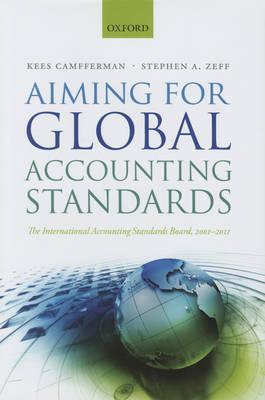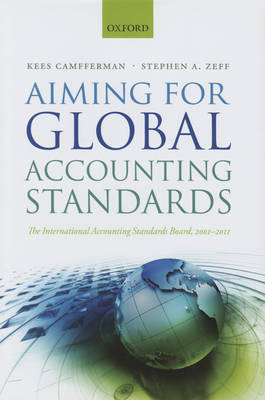
- Afhalen na 1 uur in een winkel met voorraad
- Gratis thuislevering in België vanaf € 30
- Ruim aanbod met 7 miljoen producten
- Afhalen na 1 uur in een winkel met voorraad
- Gratis thuislevering in België vanaf € 30
- Ruim aanbod met 7 miljoen producten
Zoeken
Aiming for Global Accounting Standards
The International Accounting Standards Board, 2001-2011
Kees Camfferman, Stephen A Zeff
Hardcover | Engels
€ 143,45
+ 286 punten
Uitvoering
Omschrijving
The International Accounting Standards Board (IASB) and its International Financial Reporting Standards (IFRSs), have acquired a central position in the practice and regulation of financial reporting around the world. As a unique instance of a private-sector body setting standards with legal force in many jurisdictions, the IASB's rise to prominence has been accompanied by vivid political debates about its governance and accountability. Similarly, the IASB's often innovative attempts to change the face of financial reporting have made it the centre of numerous controversies. This book traces the history of the IASB from its foundation as successor to the International Accounting Standards Committee (IASC), and discusses its operation, changing membership and leadership, the development of its standards, and their reception in jurisdictions around the world. The book gives particular attention to the IASB's relationships with the European Union, the United States, and Japan, as well as to the impact of the financial crisis on the IASB's work. By its in-depth coverage of the history of the IASB, the book provides essential background information that will enrich the perspective of everyone who has to deal with IFRSs or the IASB at a technical or policy-making level.
Specificaties
Betrokkenen
- Auteur(s):
- Uitgeverij:
Inhoud
- Aantal bladzijden:
- 690
- Taal:
- Engels
Eigenschappen
- Productcode (EAN):
- 9780199646319
- Verschijningsdatum:
- 26/05/2015
- Uitvoering:
- Hardcover
- Formaat:
- Genaaid
- Afmetingen:
- 160 mm x 236 mm
- Gewicht:
- 1179 g

Alleen bij Standaard Boekhandel
+ 286 punten op je klantenkaart van Standaard Boekhandel
Beoordelingen
We publiceren alleen reviews die voldoen aan de voorwaarden voor reviews. Bekijk onze voorwaarden voor reviews.











